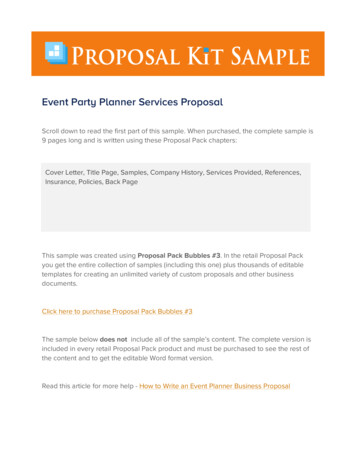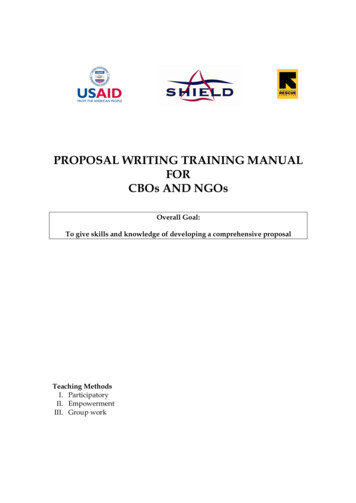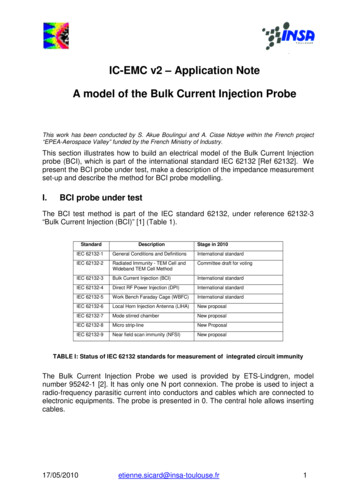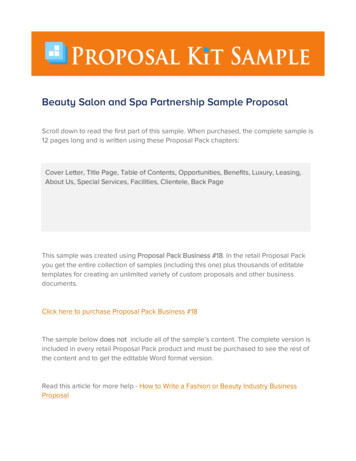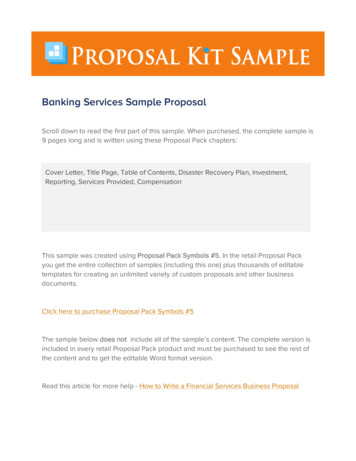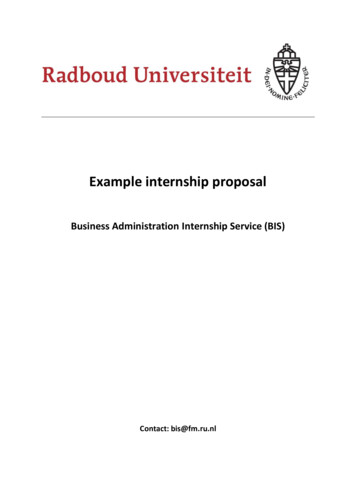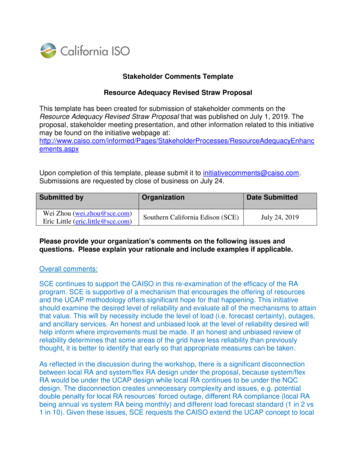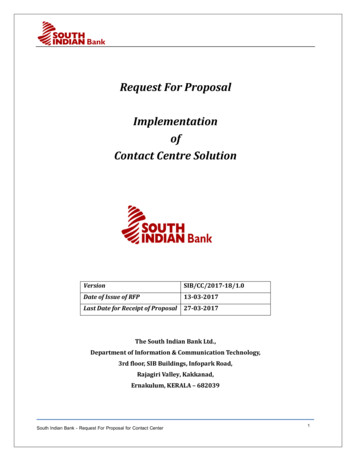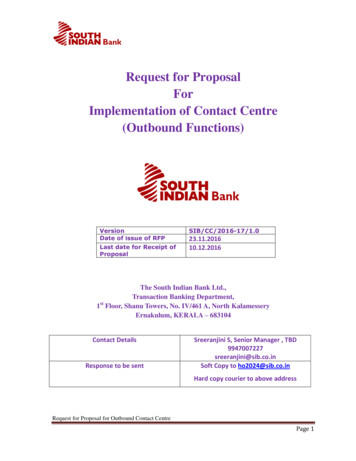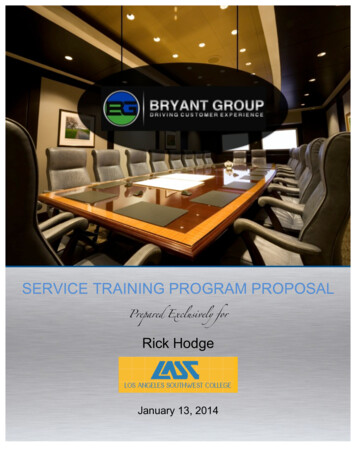
Transcription
SERVICE TRAINING PROGRAM PROPOSALPrepared Exclusively forRick HodgeJanuary 13, 2014
January 13, 2014Rick HodgeLos Angeles Southwest College1600 West Imperial HighwayLos Angeles, California 90047Dear Rick,Thank you again for reaching-out and considering us for the training needs of theclassified staff at Los Angeles Southwest College. Per our conversation pleasefind the following program proposal for review and consideration.I’m excited about the program and look forward to finalizing the details andpursuing next steps.Sincerely,2
Program OverviewThe Art of World-Class ServiceKeys to an Exceptional Customer ExperienceThe PurposeThe hallmark of a service-centric institution consists of staff that is engaged andenthusiastic about providing an exceptional customer experience. As LosAngeles Southwest College continues to improve and evolve, the ability ofclassified staff to deliver a complimentary and consistent level of service hasnever been more important.The PlanWe will develop and deliver a customized workshop to engage, equip and inspireclassified staff to take their service delivery to another level. This transformativeprogram will include interactive exercises, practical examples, and real-timecoaching in a fun yet focused environment.The Payoff Define world-class service and increase awareness and commitment todeliver exceptional customer experiences. Equip staff with proven techniques in building rapport and exceedingexpectations for internal and external customers. Highlight the power of first impressions and reveal secrets in mastering theinitial moments that set the tone for the customer experience. Promote and nurture greater consistency in service delivery. Provide staff members with a proven strategy for better service recovery andissue resolution. Enhance personal ownership and empowerment of staff members tocontinually improve the quality of the customer experience. And more!3
About the PresenterChris BryantCorporate Speaker & ConsultantChris Bryant is an expert in customer experience and a trusted advisor to theNational Football League, National Basketball Association and Major LeagueBaseball.His passion to coach and develop emerging leaders was honed during animpressive career with Nordstrom and the Ritz-Carlton Hotel Company where heoversaw training and development and led the largest Ritz-Carlton in NorthAmerica to a #1 rating in staff performance. He was also a select member of theRitz-Carlton Leadership Center and a spokesman for Ritz-Carlton’s legendaryservice. He is now the CEO of Bryant Group that equips sales and serviceprofessionals for professional sports teams that include the Denver Broncos,New York Giants, Oakland Raiders, New York Knicks, Tampa Bay Buccaneers,Cleveland Cavaliers, New York Jets, Charlotte Bobcats, New York Rangers, andthe San Francisco Giants to name a few.In addition to professional sports teams and Fortune 500 companies, Mr. Bryanthas provided his expertise to colleges and universities that include Stanford,University of California San Francisco, Azusa Pacific University, Pasadena CityCollege, California State University Northridge, Mt. San Antonio College and theCalifornia Department of Education.Mr. Bryant has been featured, published or appeared in Black EnterpriseMagazine, Ebony, MSNBC, Inc. 500 Magazine, and CareerBuilder.com.He received his Bachelors of Science from Michigan State University andcompleted the Executive Management Program at the University of SouthernCalifornia Marshall Graduate School of Business.4
Program Details & InvestmentWe value every client relationship and we always strive to build lasting and loyalrelationships. Therefore Bryant Group is pleased to offer this tailor-made andtransformative program at a special introductory rate for LASC.Program Details & InvestmentSession OneTHE ART OF WORLD-CLASS SERVICEKeys to an Exceptional Customer ExperienceDeliverables Include: Custom design, development anddelivery of workshop Associated materials and giveaways Pre-work and research Follow-up and support Classified StaffGroup Size: 30-35Length: 3.0 HoursDate/Time: TBDSession Two Classified StaffGroup Size: 30-35Length: 3.0 HoursDate/Time: TBDNormal Program Rate 6,000LASC Introductory Rate 2,500W e L ook Forward to an O utstanding P rogram!5
LOS ANGELES SOUTHWEST COLLEGEPROFESSIONAL DEVELOPMENTPLAN 2013 – 2016Professional Development supports the mission of LosAngeles Southwest College by promoting excellence inperformance and personal growth among faculty,staff, and administrators.
INTRODUCTIONThe employees at Los Angeles Southwest College (LASC) are its most valuable resource. Assuch, Los Angeles Southwest College is committed to providing a continuum of professionalenrichment opportunities for all employees.The Professional Development Plan reflects the College’s Strategic Plan, Institutional Goal 3:Instructional Effectiveness and Accountability, which seeks to “enhance institutionaleffectiveness and accountability through data-driven decision making, as well as planning,evaluation, and improvement of college programs, professional development opportunities, andgovernance structures.”The purpose of the Professional Development Program at Los Angeles Southwest College is toenhance institutional effectiveness by providing opportunities to promote excellence inperformance and personal growth among, faculty, staff, and administrators.Professional Development Plan ObjectivesThe objectives of the 2013-2016 Professional Development Plan at Los Angeles SouthwestCollege are as follows:1. Encourage the enhancement of competencies in instructional, organizational, andpersonal areas.2. Foster innovation and exploration of new ideas and strategies for institutional growthand enrichment of the educational process.3. Support enhanced communication among all members of the college community.4. Identify personnel who excel in their respective disciplines or departments.5. Promote the development of skills in new technologies.6. Increase the effectiveness of the Professional Development Program.PROFESSIONAL DEVELOPMENT PLAN 1February 2014
DEFINITION OF PROFESSIONAL DEVELOPMENTThe term “professional development” is the opportunity for faculty, staff, and administrators toimprove their skills, expand their knowledge base, and become more enlightened and awareemployees. At LASC, it is also referred to as Flex Day, staff development, or instructionalimprovement. It is important for all employees to realize the key role that they play instudents’ success. In the end, it can be said that the ultimate goal of all professionaldevelopment is improved student achievement (Mundry & Loucks-Horsley, 1999).Groups to be served include instructional and non-instructional faculty, classified staff, andadministrators. Goals, objectives, and resources will focus on the needs of all collegepersonnel.Professional Development CategoriesLASC strives to include the following categories of professional development:1. Discipline DevelopmentThese professional development activities are designed to enhance professionalknowledge and skills within each person’s academic discipline or professional job area.Activities include, but are not limited to: Courses, conferences, seminars, and workshops Participation in research and individual studies Educational travel (domestic and international) Certification training and certification2. Instructional DevelopmentThese activities relate directly to teaching methodology or techniques, assessmenttechniques, and other non-discipline specific experiences. Activities may include: Conferences, seminars, workshops, and teleconferences on assessment Focus groups on teaching styles Workshops on classroom research, teaching methods, or learning styles3. Career/Personal DevelopmentThese activities address opportunities for personnel to expand their career goals andaddress their personal needs. Topics may include: Microsoft Office certification Stress management, conflict resolution, time management, and retirement Communication skills, team building, time management, career management4. Leadership DevelopmentThese activities provide leaders and emerging leaders with opportunities to learn, grow,and change in order to develop knowledge, skills, and tools to function effectively withinthe organization. Topics may include, but are not limited to: Supervisory skills Goal setting and measuring effectivenessPROFESSIONAL DEVELOPMENT PLAN 2February 2014
Training for new administratorsNEEDS ASSESSMENTThe assessment of individual and organizational unit professional development needs isconducted annually.Individual Needs AssessmentFaculty members develop individual annual plans for professional and personal growth for thepurpose of instructional improvement (Title V, Section 55726(a)) using the Flex Form (seeAppendix A). This plan may encompass any combination of individually designed activities,institutionally planned workshops, conferences, and/or academic courses. All instructionalfaculty members are required to complete and report instructional improvement hours asshown in the table below.Full-Time Instructional FacultyFull-Time Faculty withAdditional Hourly LoadsFaculty with Release TimeAssignmentsAdjunct FacultyMust complete 33.5 hoursMust complete 33.5 hours plus one-half of their totalannual hourly assignmentMust complete and report on a pro-rata basis. Forexample, a 60% teaching assignment must complete60% of 33.5 hoursMust complete one half of their total annual hourlyassignmentClassified staff and administrators identify individual professional development goals as part oftheir annual performance evaluations with their supervisors.Additionally, all employees are asked to complete a Professional Development Survey (seeAppendix B) during the spring semester to inform the development of the next year’s TrainingCalendar.Organizational Unit Needs AssessmentEach organizational unit of the College develops annual goals and corresponding professionaldevelopment needs that are required to support those goals. Organizational Unit professionaldevelopment needs will be a part of the 2014-2015 Program Review process.PROFESSIONAL DEVELOPMENT PLAN 3February 2014
EVALUATIONEvaluation is needed to ensure that the goals of the LASC Professional Development Plan aremet. This evaluation must be an ongoing process which involves the following persons/groups:1. Individual Participants – Opinions of faculty, staff, and administrators are obtainedthrough individual discussions, interviews, or questionnaires on an annual basis.2. Supervisors – Opinions of those persons who are directly responsible for the growth ofparticipants will be obtained through interviews, group discussions, or in written formon an annual basis.3. Professional Development Committee – This committee will annually review theLASC Professional Development Plan’s goals, objectives, processes, and overalleffectiveness. See Appendix C for the Professional Development CommitteeMembership.In addition, each of the objectives listed under the goals below will be measured on an annualbasis. These results will be regularly discussed in the Professional Development Committee, andspecific actions will be taken to improve the results they are below expectations.PROFESSIONAL DEVELOPMENT PLAN 4February 2014
GOALS AND OBJECTIVESThe goals and objectives of the 2013-2016 Professional Development Plan at Los AngelesSouthwest College are as follows:Goal 1:Encourage the enhancement oforganizational, and personal areascompetenciesininstructional,Objective 1:Provide training sessions to address specific topics identified in theannual professional development survey and program reviews.Objective 2:Provide an annual College orientation for all new employees.Objective 3:Provide personnel with informationopportunities on a monthly basis.Objective 4:Increase the percentage of faculty, staff, and administrators by 25%who participate in professional development activities, using 20122013 as a baseline.onavailabletrainingGoal 2: Foster innovation and exploration of new ideas and strategies forinstitutional growth and enrichment of the educational process.Objective 1:Provide employees with access to informational and instructionalpublications.Objective 2:Allocate release time and/or financial resources for employees toidentify and prepare for emerging technologies.Objective 3:Continue the LASC Faculty Academy.Goal 3: Support enhanced communication among all members of the collegecommunity.Objective 1:Goal 4:Provide annual opportunities for building skills in human relationshipsand interpersonal dynamics.Identify personnel who excel in their respective disciplines ordepartments.Objective 1:Support the annual “Outstanding Faculty of the Year,” “OutstandingClassified Staff of the Year,” and “Outstanding Adjunct Faculty of theYear” awards.Objective 2:Publish ollegePROFESSIONAL DEVELOPMENT PLAN 5February 2014
Goal 5:Promote the development of skills in new technologies.Objective 1:Goal 6:Provide technology training that supports instructional and noninstructional needs as identified in the annual professionaldevelopment survey and program reviews.Increase the effectiveness of the Professional Development Program.Objective 1:Conduct an annual evaluation of the Professional Development Planand corresponding activities.Objective 2:Develop a three-year professional development plan for 2016-2019by the end of the spring 2016 semester.PROFESSIONAL DEVELOPMENT PLAN 6February 2014
RESPONSIBILITIESThe responsibilities, roles, and interrelationships of the various groups and individuals requiredto develop and sustain professional development across all elements of the College aredescribed below:A. President and College Management Team1. Provides financial and personnel support within assigned resources to supportactivities required to meet the college goals and the goals of the ProfessionalDevelopment Plan2. Provides leadership and support for the approved professional developmentactivities.B. Vice President of Academic Affairs and Vice President of AdministrativeServices1. Monitor expenditures and be accountable for administrative resources and fundsapproved for professional development activities2. Provide an annual report of the expenditures for professional development providedthrough the Professional Development Plan3. Coordinate with the Professional Development Committee in the preparation andpublication of the college-wide Professional Development Plan and promoteawareness of professional development opportunities within the collegeC. Professional Development Committee1. Review the LASC Professional Development Plan annually and update every threeyears2. Review past expenditures for faculty and staff relative to professional developmentopportunities and make recommendations about future employee needs3. Implements the Professional Development Plan as approvedPROFESSIONAL DEVELOPMENT PLAN 7February 2014
ANNUAL PROFESSIONAL DEVELOPMENT CALENDARLASC follows the following annual Professional Development Calendar.AUGSEPOCTNOVJANFEBMARAPRMAYJUN Implement Fall FlexImplement New Employee OrientationBegin LASC Faculty Academy (continues through May)Implement Professional Development Activities (continues through May)Departments submit Professional Development Needs Module (Program Review)Plan Spring FlexImplement Spring FlexReview department professional development needsAdminister annual Professional Development SurveyReview survey results and plan training activities for upcoming academic yearAssess annual professional development plan and activities for the current yearPlan Fall FlexPresent training priorities and Training Calendar for the upcoming academic year2013-2014 Training CalendarThe college encourages participation in a variety of professional renewal activities and makesevery effort to provide opportunities in each of the four professional development categories:Discipline, Instructional, Career/Personal, and Leadership Development.The Training Calendar below outlines the professional enrichment activities that will be offeredduring the 2013-2014 academic year.JULFall Flex DayFaculty OrientationSpring Flex DayLASC Faculty Academy*Great Teachers SeminarSLO WorkshopsCustomer Service TrainingClassified Staff MiniRetreatsStaff Appreciation DayDepartment MeetingsBrown Bag LunchesMOS Certification20 Minute oingOngoingOngoing*The LASC Faculty Academy is typically offered as a full-year program that begins in the fall semester. Due to budgetlimitations, an abbreviated academy will be offered in spring 2014, but the full-year program will be restored in fall 2014.PROFESSIONAL DEVELOPMENT PLAN 8February 2014
ALLOCATION OF PROFESSIONAL DEVELOPMENT FUNDSDistrict-wide Tuition ReimbursementLos Angeles Southwest College is committed to the continuing development of its employees.To encourage the holistic development of its employees, the collective bargaining units havefunds available for employee participation in conferences, workshops, institutes, and courses.Funds are available on a first-come-first-serve basis. Forms are available on the Los AngelesCommunity College District website.Classified StaffClassified staff members may receive tuition reimbursement up to 3,000 not to exceed50% (100% if classes are taken in the Los Angeles Community College District) in any oneacademic year.FacultyThe amount of tuition reimbursement a faculty member can receive for tuition paid duringa single academic year is limited to 50% of the tuition paid, or 3,000, whichever is less.Faculty members are also eligible to receive up to 1,500 per academic year for the cost ofattendance at professional conferences, workshops, and seminars.AdministratorsAdministrators may receive tuition reimbursement to a maximum of 2,000 in any oneacademic year. The tuition reimbursement may not exceed 50% of the actual tuition forany educational term. However, all allowable expenses may be reimbursed for conferenceattendance.Tuition Reimbursement (Faculty Only)The amount of tuition reimbursement a faculty member can receive for a tuition paidduring a single academic year is limited to 50% of the tuition paid, or 500, whichever isless. Faculty members are also eligible to receive up to 600 per academic year for the costof attendance at professional conferences, workshops, and seminars.PROFESSIONAL DEVELOPMENT PLAN 9February 2014
Professional Development BudgetIn addition to these funds, the College has allocated the following funds for the 2013-2016Professional Development Plan.Fall Flex DaySpring Flex DayLASC Faculty AcademyNew Employee OrientationStaff Appreciation DayGreat Teachers Seminar20 Minute MentorCustomer Service TrainingClassified Staff Mini RetreatsSLO WorkshopsMOS CertificationTotal2013-2014 3,000 2,500 10,000 2,500 3,500 6,000 1,400 2,500 3,000 2,000 700 37,1002014-2015 3,000 2,500 10,000 2,500 3,500 4,000 1,400 2,500 3,000 2,000 700 37,1002015-2016 3,000 2,500 10,000 2,500 3,500 4,000 1,400 2,500 3,000 2,000 700 37,100PROFESSIONAL DEVELOPMENT PLAN 10February 2014
APPENDIX ALOS ANGELES SOUTHWEST COLLEGEPROFESSIONAL GROWTH AND DEVELOPMENTTo:All FacultyFrom:Alistaire Callender, Professional Development CoordinatorSubject:Professional DevelopmentHello and welcome to Academic Year 2012-2013. Whether you call it FLEX, professional development, staffdevelopment, or instructional improvement, they all mean the same thing: the opportunity for faculty to improve theirskills, expand their knowledge base, and become more enlightened and aware. As faculty it is important to realizethat we play a key role in our students’ success. In the end, it can be said that the ultimate goal of all professionaldevelopment is improved student achievement (Mundry & Loucks-Horsley, 1999).YOUR FLEX OBLIGATIONFLEX is a contractual obligation. The purpose of FLEX is to provide time for faculty to participate in development activities thatare related to “staff, student, and instructional improvement” (title 5, section 55720). The FLEX program allows faculty (full-time,part-time, instructional and non-instructional) the time to work individually or with groups to achieve improvement in three distinctareas: Staff improvement Student improvement Instructional improvementEach faculty member is responsible for the development of his or her individual plan for professional and/or personal growth forthe purpose of instructional improvement (title 5, section 55726(a)). This individual plan may encompass any combination ofindividually designed activities, institutionally planned workshops, conferences, and/or academic courses. All classroom facultyshall complete and report an hourly commitment equal to or greater than the number of instructional improvement hoursrequired. How to configure your instructional improvement obligation:Full-Time Faculty must complete and report 33.5 hours.Full-Time Faculty with additional hourly loads must complete and report 33.5 hours plus one-half of their total annual hourlyassignment.Faculty with release time assignments must complete and report on a pro-rata basis. For example, a 60% teachingassignment must complete 60% of 33.5 hours.Adjunct Faculty must complete and report one half of their total annual hourly assignment.INSTRUCTIONAL IMPROVEMENT FORMS ARE DUE NO LATER THAN JUNE 1, 2013. FAILURE TO COMPLETE YOUR OBLIGATIONAFFECTS YOUR WAGES AS WELL AS YOUR FACULTY EVALUATION.INSTRUCTIONAL IMPROVEMENT ACTIVITIESThere are many activities that are coordinated on campus by Professional Development as well as faculty or departments.Please see the attached list for pre-approved campus and District activities. Individual activities are any professionaldevelopment activities not coordinated by Professional Development that a faculty member completes on their own.CONFERENCE ATTENDANCEPer the AFT Contract, Article 23 Professional Development Rules and Practices, each college shall establish a ProfessionalConference Fund. At Southwest College, full-time faculty are eligible to receive up to 475.00 per academic year for conferenceattendance. Adjunct faculty with priority are eligible to receive up to 200.00 per academic year for conference attendance. Fundsare available on a first-come-first-serve basis with priority given to those that submit their request in advance. Forms are availableon the Southwest website.February 2014PROFESSIONAL DEVELOPMENT PLAN 1
LOS ANGELES SOUTHWEST COLLEGETUITION REIMBURSEMENTFurthering your education and/or training is also a contractual perk for both regular and adjunct faculty. If you are interested inpursuing a specific course of study or training, reimbursement shall be limited to 50% of the tuition paid or 2000.00, whichever isless during a single academic year. Adjunct faculty must have priority status to apply. Forms are available on the Southwestwebsite.February 2014PROFESSIONAL DEVELOPMENT PLAN 2
ADVANCEMENT IN ACADEMIC RANKBoth full-time and part-time faculty has the opportunity to advance in rank at Southwest College. Advancement in Rank formsare available on the Southwest website.Full-Time:Advancement from Assistant to Associate Professor after 5 years of serviceAdvancement from Associate Professor to Professor after 10 years of serviceAdjunct:Advancement from Instructor to Adjunct Assistant Professor after working 4 semesters within a3-year academic calendar periodFREQUENTLY ASKED QUESTIONS ABOUT PROFESSIONAL DEVELOPMENTWhat are Professional Development, FLEX and Instructional Improvement?They are all terms describing the same thing: an opportunity for classroom faculty to participate in formal and Informalactivities in the assistance of acquiring new skills, developing insights into pedagogy, and exploring new or advancedunderstandings of content and resources in the classroom. The term “flex” is derived from the flexible calendarconcept.Who must complete Instructional Improvement/FLEX hours?Instructional Improvement hours are contractually required of all classroom faculty, both full-time and part-time.The District is required by provision of the California Education Code to account for the hours of “in lieu of” instruction.Why do I have to do it?Because it is a contractual obligation and you are being paid for 5 days you do not have to work.What kind of a plan is involved?Professional Development/FLEX is not just about documenting hours from the activities that you have participated in. It is aboutdeveloping an individual plan and setting a goal for you for the academic year.When are the Instructional Improvement forms due?Instructional Improvement forms are due by June 1, 2013. Be sure to keep a copy for yourself.What doesn’t count towards Instructional Improvement?Instructional Improvement activities cannot include tasks that are an ongoing part of the regular teachingresponsibilities such as grading papers, choosing textbooks, writing lesson plans or syllabus guides. Travel timeand personal meal time at a conference does not qualify for Instructional Improvement hours. Attendance at unionmeetings is not considered Instructional Improvement and Instructional Improvement time cannot be “banked”towards the next Professional Development year.What if I want to present a workshop on campus because I have something really important to share and Ithink others would benefit as well?Good question! Just email me and I will help you set it up – callenab@lasc.eduPlease feel free to contact me if you have any questions about Professional Growth and Development.callenab@lasc.eduFebruary 2014PROFESSIONAL DEVELOPMENT PLAN 3
LOS ANGELES SOUTHWEST COLLEGE2012- 2013Instructional Improvement AgreementJuly 1, 2012 – June 30, 2013NameEmployee #LastFirstDisciplineM.I.ExtEmailMailbox #Please indicate your status and number of hours you need to complete and report from July 1, 2012 – June 30, 2013:( ) Full-Time Faculty –must complete and report 33.5 hours( ) Full-Time Faculty with additional hourly loads –must complete and report 33.5 hours ½ of their total annual hourly assignment( ) Faculty with release time assignment –must complete and report on a pro-rata basis.For example, a 60% teaching assignment must complete 60% of 33.5 hours( ) Adjunct Faculty – must complete and report ½ of their total annual hourly assignment (Fall - Spring)Please indicate your instructional improvement goal(s) for the 2012-2013 academic year: Institutional Growth/Development Multicultural Awareness Professional Enhancement Student Personnel Services OtherDescribe how you plan to satisfy your instructional improvement goal(s): Improvement of Instruction Personal Enhancement Technological ProficiencyINSTRUCTIONAL IMPROVEMENT ACTIVITY or ACTIVITIES YOU PARTICIPATED INTO SATISFY YOUR INSTRUCTIONAL IMPROVEMENT GOAL(S)Activity #DateDescription of ActivityHoursTotal HoursI understand that Professional Development/FLEX activities are considered a contractual obligation and Professional Development/FLEX days areincluded in my salary, as negotiated by the AFT. I certify that the information reported on this form is true and correct and that I have satisfied myInstructional Improvement obligation as prescribed by law. Please submit this form via email to XXXX@lasc.edu or to mailbox #155 no later thanJune 1, 2013 and be sure to make and keep a copy for yourself.Certification:Employee’s SignatureDateAcceptance:Professional Development CoordinatorDateFebruary 2014PROFESSIONAL DEVELOPMENT PLAN 4
LOS ANGELES SOUTHWEST COLLEGEPROFESSIONAL GROWTH AND DEVELOPMENTPRE-APPROVED INSTRUCTIONAL IMPROVEMENT ACTIVITIES2012- 2013COLLEGE/CAMPUS GENERAL ACTIVITIESCOLLEGE CONVOCATION Credit – up to 6 hoursMandatory professional development day for all full-time facultyDate/Time: August 23, 2012COLLEGE LEADERSHIP RETREATCredit – up to 6 hoursOff-Campus event for faculty, staff and administrationDate/Time: August 21, 2012ADJUNCT FACULTY ORIENTATIONCredit - 5 hoursOrientation information for adjunct facultyDate/Time: TBATEACHING DIRECTED STUDIES COURSES (UNPAID)Credit - no limitDate/Time: TBACredit for instructors who are teaching 185/285/385 courses. This is unpaid teaching that greatly contributes to the college.PROFESSIONAL SERVICE TO THE COLLEGE (UNPAID)Credit - no limitDate/Time: TBAProfessional services provided to the college without compensation or remuneration.DEPARTMENT MEETINGSCredit - no limitDate/Time: TBACoordinated by individual department chairs. Adjunct faculty may take hour credit for attending any department meeting. F/Tfaculty may only receive hour credit if the meeting is instructional in nature, such as learning how to use the media cart, guestspeaker in how to develop SLO’s, etc.EXTRAORDINARY COMMITTEE SERVICECredit - no limitDate/Time: TBAFaculty members participating in more than one campus committee assume an extraordinary amount of responsibility for thecollege. Faculty may receive instructional improvement hours for time spent on the second, third, fourth, etc. committee. SLO(STUDENT LEARNING OUTCOMES) DEVELOPMENT and/or TRAININGCredit - no limitDate/Time: TBAFaculty development or training in SLO’s.CURRICULUM DEVELOPMENTCredit - no limitDate/Time: TBACredit - no limitFor faculty participating in the mentor-mentee program.Date/Time: TBADeveloping or updating course outlines.MENTOR/MENTEE ACTIVITIESPEER-PEER FACULTY TUTORINGCredit - no limitDate/Time: TBAFaculty tutoring faculty, contact Alistaire Callender, 323-241-5353, for further information.HONORS CONTRACTSCredit - no limitCredit for those instructors that allow honors contracts.Date/Time: TBAFACULTY ADVISORCredit - no limitDate/Time: TBAFaculty advisors of student associations/groups contribute many hours of uncompensated service. The participation offaculty members is an extremel
service. He is now the CEO of Bryant Group that equips sales and service professionals for professional sports teams that include the Denver Broncos, New York Giants, Oakland Raiders, New York Knicks, Tampa Bay Buccaneers, Cleveland Cavaliers, New York Jets, Charlotte Bobcats, New York Rangers, and the San Francisco Giants to name a few.
